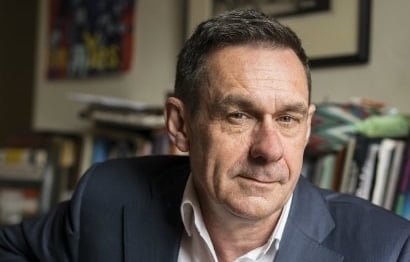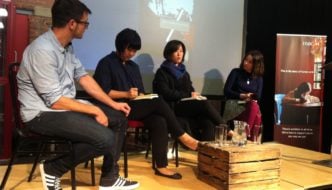Paul Mason at the Manchester Literature Festival
November 3, 2015
 As part of the Manchester Literature Festival, Economics editor of Channel 4 news and Guardian writer Paul Mason came to Manchester’s Royal Northern College of Music to discuss his new book PostCapitalism: A Guide to Our Future. The fairly large venue is packed, and everyone falls silent as Mason walks out confidently to join his interviewer, Katy Shaw, on stage. He’s a likeable guy, and the audience laugh as he opens cracking jokes. Very topical jokes of course, and everyone who reads the news enough to get it is chuckles away knowingly. But mostly there’s a feeling of anticipation: hope that Paul can tell us once and for all how to escape the seemingly inevitable fate of everlasting capitalism.
As part of the Manchester Literature Festival, Economics editor of Channel 4 news and Guardian writer Paul Mason came to Manchester’s Royal Northern College of Music to discuss his new book PostCapitalism: A Guide to Our Future. The fairly large venue is packed, and everyone falls silent as Mason walks out confidently to join his interviewer, Katy Shaw, on stage. He’s a likeable guy, and the audience laugh as he opens cracking jokes. Very topical jokes of course, and everyone who reads the news enough to get it is chuckles away knowingly. But mostly there’s a feeling of anticipation: hope that Paul can tell us once and for all how to escape the seemingly inevitable fate of everlasting capitalism.
As the night draws on, however, excitement turns to concentration, eyes are narrowed and beards are stroked as the audience strains to get its head around Mason’s big concepts and claims. He attempts to bring some structure to his ponderings but often gets lost in tangents, naturally resulting in us all ending up pretty lost too. As Paul and his interviewer glug from their glasses of wine, I fail to suppress the thought that while it would probably be fantastically exciting to chat to Paul about this in a pub, in this context, with hundreds of people waiting on his every word, I couldn’t help but wish he’d got his ideas mapped out a little clearer. Or (I can’t believe I’m writing this) made a PowerPoint or something.
But I’ll do my best to sum up what he was getting at. Mason’s basic premise is that capitalism is at a dead end, and that developments in IT may already be paving the way to a fundamental reconfiguration of our understanding of economics.
He asserts first of all that the capitalist system is broken in a number of ways. Three of them, he says (but gets a bit lost so I’m using a copy of the book to cross-reference). Firstly there’s fiat money. The crisis of 2008 was a signal from the future that the remedy is illusory: ‘cheap money being used to fix a crisis caused by cheap money’ is a method which runs the risk of long-term stagnation of the world economy.
Secondly he quotes financialisation, an inherent feature of neoliberalism, as a trigger of the crisis and of outrageous levels of inequality. Workers receive a falling share of profits, while a growing share is generated out of their mortgages and credit cards as they are forced into the financial system to live. He says we’ve become ‘slaves to interest payments’, generating profits not only for our bosses but also for the intermediary financial sector as we borrow more and more. In other words, the neoliberal system boosts profits for a country by impoverishing its own citizens.
The last cause of crisis he lists is that of global imbalances in trade, saving and investment. It led to the 2008 crisis as America, Britain and Europe’s financial systems took on unsustainable debt, leaving most neoliberalised countries with unpayable amounts of government debt. And not to forget, of course, that we’re plummeting full speed ahead towards devastating climate crisis.
But the good news, Mason says, is that developments in information technology have come together to offer us an escape route, out of capitalism and into a more sustainable and egalitarian. This can also be summarised loosely in three points. He firstly points out that the price mechanism is being dissolved for information goods, an increasingly integral part of our lives. This basically means something that can be downloaded an infinite number of times and produced at no cost cannot have the competition that surrounds physical goods. Through the enforcement of law a certain degree of artificial security is produced, but Paul argues it means fighting a losing battle: information is meant to be free.
Secondly, developments in automation mean that currently 40% of all jobs could be automated. This would mean not only physical things collapsing in price, but also less work and more play. Thirdly, Mason asserts that the notion of ownership hierarchy is declining, while networks and collaboration prosper as the internet removes barriers to communal production. Wikipedia and Linux are just two examples of widely used open-source alternatives to commercially produced information products.
So Paul invites us to put on our ‘post-capitalism goggles’ and allow ourselves to see that what was once considered utopian fantasy might be a lot closer than we might have thought. He sees the potential of the creation of a horizontal, non-managed and non-regulated economy. His prediction is that younger, inspired generations, newly empowered by unlimited access to knowledge and mobilitsation towards activism will play an important role in this process. However, he goes on, for it to be plausible, centralised action on the part of the state would be necessary to nurture these schemes. While de-centralised action is heavily fetished, Mason holds that the state has to accept that we are in a period of transition and recognise capitalism as a dead end.
If that sounds unlikely to you, then you’re not the only one thinking so. Paul himself recognises that governments in their current state are evidently hell-bent on working within given structures, blindly crashing forth as programmed, as if nothing could go wrong. And while his ideas as they stand are interesting in themselves, stringing them all together to form any kind of coherent picture that could be effectively implemented by a government is difficult. Whether this was due to Paul’s delivery or the fact that he himself hasn’t quite figured it out I’m not sure.
But at the end of the day, he isn’t claiming to know exactly what form this next era will take. As the factory would have seemed inconceivable to people prior to the Industrial Revolution, he says, we too are unable to fathom exactly what will catalyse this coming shift. Mason’s role, rather than piecing it all together for us, is to bring light to observations which he feels hint at an exciting potential for a different future – which he leaves to someone else to examine and foster and make into something workable, with the trust that the unprecedented power of the conscious individual will lead to a non-violent, more equal economic system.
So is this feasible, or just utopian fantasy? Don’t get me wrong, I really want to believe he’s onto something. And its reassuring to know that someone with a background in economics and large following is pushing these ideas. I’m sure I’m not the only one who knows what it feels like to be mid-debate, when someone goes and throws in a load of economic jargon which shuts down the conversation immediately.
It can seem like left-leaning ideas and economics are incompatible; you’re speaking two different languages. To those on the left, economics is meaningless discourse and to right-wing economists, policies which prioritise anything other than progress and profit are far-fetched idealism. The two positions often seem so fundamentally opposed that there is zero common ground from which to start any kind of logical discussion when you’re not just talking at one another. So yeah, it’s good to know someone knows his stuff about both and thinks it can work somehow.
When I stand up to leave I hear someone mumble, “I mean it was good… Just not nearly as inspiring as I thought it would be”. It’s clear that there is an appetite for a feasible alternative, but also a fair amount of scepticism. It’s time, perhaps, to start being a bit more optimistic. Best be getting our post-capitalism goggles on.




Comments